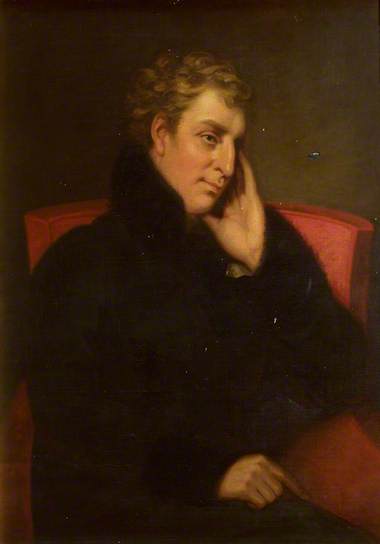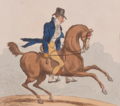Henry Dillon, 13th Viscount Dillon facts for kids
Quick facts for kids
Henry Augustus Dillon-Lee
|
|
|---|---|
| Viscount Dillon | |
|
Detail from the portrait below
|
|
| Tenure | 1813–1832 |
| Predecessor | Charles, 12th Viscount Dillon |
| Successor | Charles, 14th Viscount Dillon |
| Born | 28 October 1777 Brussels |
| Died | 24 July 1832 London |
| Spouse(s) | Henrietta Browne |
| Issue Detail |
Henrietta, Charles, Constantine, & others |
| Father | Charles, 12th Viscount Dillon |
| Mother | Henrietta Maria Phipps |
Henry Augustus Dillon-Lee, 13th Viscount Dillon (1777–1832), was an important figure in Irish and British history. He was a politician, a soldier, and a writer. Even though he was Protestant, he strongly supported Catholic emancipation in Ireland. This meant he wanted Catholics to have the same rights as Protestants.
He served as a Member of Parliament (MP) for Harwich in England. He was an MP in the very last parliament of Great Britain and the first parliament of the United Kingdom. Later, he represented County Mayo in Ireland. He also led a military regiment and wrote books about military topics and historical novels.
Contents
Early Life and Family
Henry Augustus was born on October 28, 1777, in Brussels. At that time, Brussels was the capital of the Austrian Netherlands. His parents were Charles Dillon-Lee, the 12th Viscount Dillon, and Henrietta Maria Phipps. His father had become a Protestant in 1767.
Henry Augustus's mother, Henrietta Maria Phipps, was the daughter of Constantine John Phipps, 1st Baron Mulgrave. Her family was Anglo-Irish, meaning they were English families who had lived in Ireland for a long time. Both of Henry's parents were Protestants. They were part of the "Protestant Ascendancy" in Ireland. This was a group of wealthy Protestant families who held most of the power and land.
Henry Augustus's mother passed away in 1782 when he was only four years old. In 1787, his father married again to Marie Rogier. She was an actress from Mechelen, Belgium. Henry Augustus gained three half-siblings from this second marriage.
He was raised by his uncle, Constantine Phipps, 2nd Baron Mulgrave.
Military and Political Career
When Henry Augustus was 17, in 1794, he became a colonel in a new military group called the Catholic Irish Brigade. This was unusual because he was Protestant. However, his family had strong connections to the famous Irish Brigade in France. This Catholic Irish Brigade only lasted four years, ending in 1798.
In 1799, at age 22, Henry Augustus became a Member of Parliament (MP). He won a special election for the area of Harwich Borough in Essex, England. This was during the last parliament of Great Britain. This parliament then became the first parliament of the United Kingdom from 1801 to 1802.
In 1802, he was elected again. This time, he represented County Mayo in Ireland in the House of Commons.
In 1805, he formed a new regiment in Ireland called the Duke of York's Irish or the 101st Regiment of Foot. He actually owned this regiment and rented out its services to the British army.
Marriage and Children
In February 1807, Henry Augustus Dillon-Lee married Henrietta Browne. She was the sister of Dominick, 1st Baron Oranmore and Browne. Her family, the Brownes of Mayo, were also an Anglo-Irish Protestant family. Their wedding took place at Castle MacGarrett, near Claremorris, in County Mayo, Ireland.
Henry Augustus and Henrietta had ten children:
- Henrietta Maria (1807–1896): She married Edward Stanley, 2nd Baron Stanley of Alderley. Henrietta was known for working to improve education for girls.
- Charles Henry (1810–1865): He was born in Dublin and later became the 14th Viscount Dillon after his father.
- Theobald Dominick (1811–1879): He became the 15th Viscount Dillon. He did not have children.
- Arthur Edmund Denis (1812–1892): He married Ellen Adderley and became the 16th Viscount Dillon after his brother.
- Constantine (1813–1853): He moved to New Zealand.
- Robert George Lee (1817–1822): He died when he was very young.
- Margaret Frances Florence (1818–1885): She was a maid of honour to the Queen. She married the geologist William Hamilton.
- Gerald Normanby (1823–1880): He married Louisa FitzGibbon and changed his last name to hers.
- Louisa Anne Rose (1825–1902): She married Spencer-Cecil Ponsonby.
- Helena Matilda (born 1827)
Later Life and Legacy
Henry Augustus's regiment was sent to Halifax, Nova Scotia, Canada. He took his wife and their eldest child with him. His first child was born there in 1807.
On November 9, 1813, his father passed away. Henry Augustus, at 36 years old, then became the 13th Viscount Dillon.
As Lord Dillon, he lived with his family in Florence, Italy, in the late 1810s. In the 1820s, they lived in London. During this time, he wrote two historical novels: Maltravers, published in 1822, and Rosaline de Vere, published in 1824.
Henry Augustus Dillon-Lee died on July 24, 1832, in London. He was buried at All Saints Church in Spelsbury. He was the first Dillon family member to be buried there. His wife, Henrietta, lived for another thirty years. She passed away in Paris in 1862 at the age of 73.
Works
Henry Augustus Dillon-Lee wrote on various subjects, including military strategy, politics, and historical fiction. Some of his notable works include:
- Short View of the Catholic Question (1801): This book discussed the rights of Catholics in Ireland.
- A Commentary on the Military Establishments and Defence of the British Empire (1811): A book about military organization.
- The Tactics of Ælian: Comprising Military Systems of the Grecians (1814): A work on ancient Greek military tactics.
- The Life and Opinions of Sir Richard Maltravers (1822): One of his historical novels.
- Rosaline de Vere (1824): Another historical novel.
Images for kids
-
Henry Dillon-Lee, Viscount Dillon, by John Hoppner
-
Breaking my own horse (H. A. Dillon) by James Gillray, 1803
 | Aaron Henry |
 | T. R. M. Howard |
 | Jesse Jackson |




